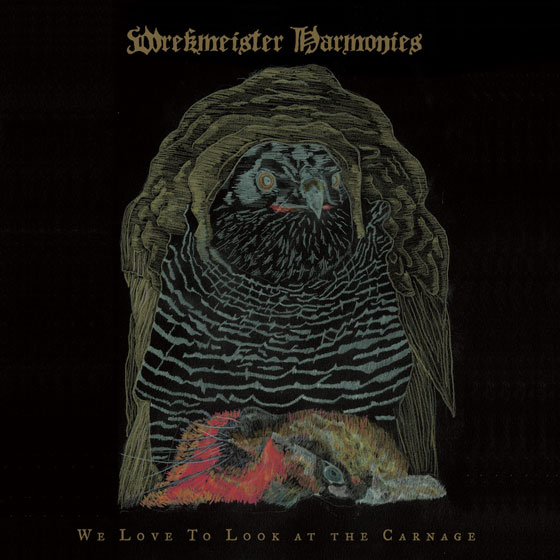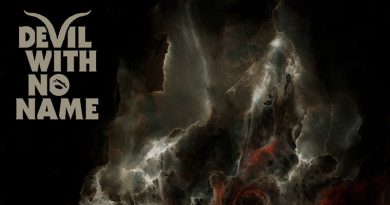Review: Wrekmeister Harmonies ‘We Love To Look At The Carnage’
For some, great music is just a series of notes and beats, anonymously filling the background as an alternative to the mundane—an escape from boredom but still never paid the respect it deserves as transcendent. For others, like J.R. Robinson and Esther Shaw of Brooklyn, NY’s Wrekmeister Harmonies, great music can be a religious experience, and to actually create great music brings one that much closer to ‘god’.

We Love To Look At The Carnage, like much of the group’s back catalogue, is steeped in philosophy, with musical compositions often literally embodying the lyrical messages delivered. Tracked in a remote cabin in Woodstock, NY, with contributions from percussionist Thor Harris (Swans, Shearwater), Jamie Stewart (Xiu Xiu) on electronics, and mixed by Martin Bsi (Sonic Youth, Swans), the album draws on feelings of desolation and loneliness—a kind of self-imposed isolation to better capture the claustrophobia of being trapped in your own thoughts. This album embodies the night, where all of the distractions of life fade away and we’re left with our personal demons to reconcile.
To understand their music, you have to appreciate Robinson’s theoretical approach to art – his belief system, that we as humans are in a perpetual state of dying, only to return to ashes or bones and ultimately to the spiritual void that predated our birth. When viewed from this perspective, the relative insignificance of a single life becomes obvious, but our very important contribution to the whole of the universe becomes equally apparent. To appreciate ‘god’ as a boundless, limitless entity, beyond good and evil, and that which permeates to the quantum level, is to understand the importance of artistic creation as a gateway bridging the void with the natural world, or, in essence, connecting with ‘god.’
We Love To Look At the Carnage takes the listener on a 40+ minute, five track journey which explores the psychological and emotional response to what can only be deemed ‘predestined utilitarianism’ – the concepts outlined in Marcus Aurelius’ Meditations play a central theme for the album’s overall message: To adopt a cosmic view of our place in this world, as our life as individuals is relatively trivial in the grand scheme, as is a generation or 3000 generations to the infinite. Our contribution to the whole of existence, however, is unique, vital, and essential. This reality is sobering for those tied to earthly pleasures and selfish desires – feeding the ego at the expense of enlightenment.
Midnight To Six tackles this reconciliation; opening with delicate keys and gentle percussion, Shaw’s ethereal vocal sets the mood until Robinson’s baritone reflections provide the perfect juxtaposition – the epitome of vulnerability as the narrator traverses the stark realities of lost time and missed opportunities. It isn’t until the varied journey of the 10+ minute Still Life With Prick Cancer that the group’s attempt to analogize the apprehension and near panic of persistent worry about impending harm, both real and delusional becomes clear. The song ebbs and flows through tension and cathartic release. Through bouts of distortion and pounding discordance, the band finds respite in periods of calm. Nearly schizoid in its non-linear structure, but the perfect incarnation of a psyche at the brink of insanity.
Shaw’s ethereal vocal sets the mood until Robinson’s baritone reflections provide the perfect juxtaposition…
The concept of a ‘dynamic state of death’ or ‘perpetual decay’ is artistic fuel for Robinson and Shaw, allowing them access to all of the very human fears, anxieties, and frustrations that accompany an awareness of the current world’s constant fight to corrupt through influence. Couple that with the knowledge of imminent mortality and it’s easy to understand why the album’s signature vibe is morose. But as looming as these existential threats may be, equally important and key to the group’s message is the human response to emotional and psychological pain.
Coyotes Of Central Park is a wonderfully romantic, yet bittersweet segue that has an immediate hook; gentle acoustics play nicely with Robinson’s resonant voice – despite the darkness of night, there’s an innate beauty to the moonlight that can idealize even the most tragic of circumstances. Having the strength to endure says more about the human condition than anything else; traversing and conquering the pervasive negativity of thought and action – to celebrate and truly embody good, is the ultimate sacrifice and contribution to the universe. And with that, hope is restored and the sun, albeit slowly, eventually rises.
But if we are to truly embrace the cycles of life and death, we have to accept that there will always come an end – a n end to love, an end to life, an end to the physical body. In closer, Immolation, Robinson cries ‘…I used to feel love…I used to feel love…choking on tears with a mouthful of organs…’ It’s an agonizing image, and often we question why tragedy happens to one and not the other. The seeming randomness of fate is the ultimate deterrent of faith in an invisible ‘god’; but adopting a stoic view, the presence of death and ill-fortune is no longer the point of focus. How you process, adapt, and respond becomes the emphasis, and in turn, you develop an understanding of your place as a cog in the wheel.
This may not be the most uplifting message for some, but for those willing to challenge their belief system and humble themselves to the forces of nature, Wrekmeister Harmonies might just be the vessel to bring you closer to the void.
Label: Thrill Jockey Records
Band Links: Facebook | Bandcamp | Twitter | Instagram
Scribed by: Jeremy Moore


